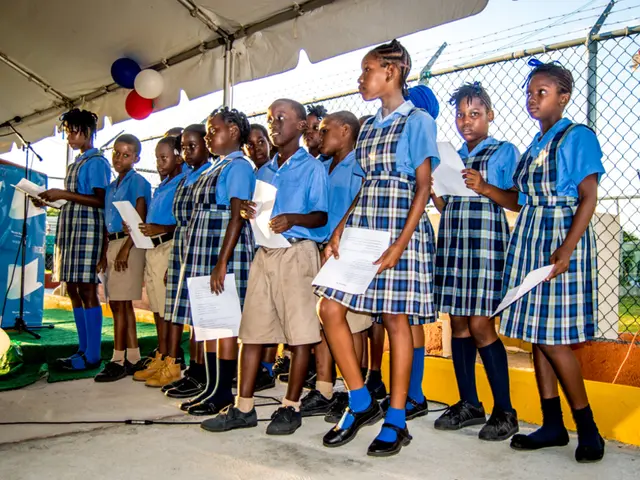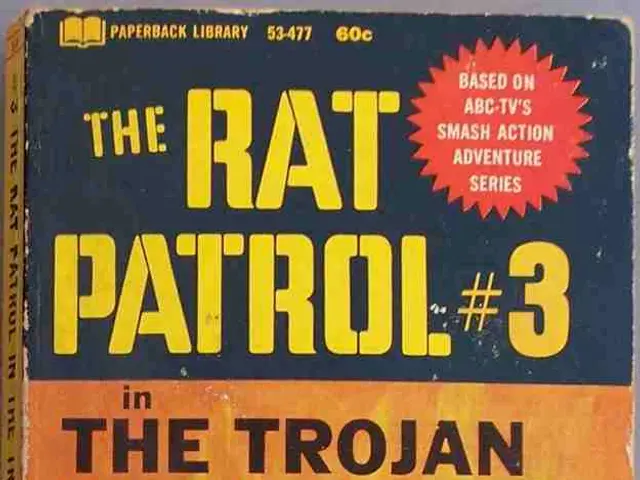Undermining Democratic Processes: Insights into President Donald Trump's Actions
Rebel Yell: How President Donald Trump is Tearing Apart Democracy
US President Donald Trump is shaking up democracy in the States, that much is clear. During his second term, he's been undermining the separation of powers, the judiciary, freedom of speech, education, and research, all while catering to his allies and demonizing those who dare to oppose him. Over 700 scientists and countless Americans stand against these moves, fearing for the future of the country.
In a recent survey on the state of the US' political landscape, the value of a scale from a pure dictatorship (0) to a perfect democracy (100) has nosedived under Trump's regime. Among scientists, it plummeted from 67 to a stark 49—a decline that hasn't been witnessed even during Trump's first term or the infamous coup attempt on January 6, 2021. The United States seems to be spiraling towards an autocratic system. But just how precarious, and lasting, is this slide?
Trump has ventured far beyond the recognized boundaries, like no president since World War II, when it comes to the separation of powers. His administration has purposefully neglected court orders or drastically limited cooperation with them. Trump himself has publicly belittled judges, while several government members have claimed that judges have no authority to review or check the president's actions. But that's precisely their role.
He views the US Congress as another agency he can boss around. Trump halted the sale of the social media platform TikTok, an agreement accepted by both parties, and even withdrew funding from unwanted agencies. According to the constitution, these decisions belong to the Congress. Trump, however, seems to disagree.
The Right to a Fair Hearing: Discarded
The right to a fair trial, or due process, is protected by the US Constitution for all individuals within the nation's borders, regardless of their citizenship. Trump's administration has repeatedly trampled upon this constitutional principle. Over the weekend, Trump called into question whether the constitution even applies to migrants. If non-citizens were denied a fair trial, it could also happen to people with a US passport, according to lawyer Denise Gilman of the University of Texas. Trump has hinted at the possibility of deporting US citizens who have committed crimes. He made such promises during his campaign.
"Equal Justice for All" may as well be a hollow slogan in the face of Trump's administration. After the Watergate scandal, the White House generally let the Department of Justice and the Attorney General follow their own course. Trump changed that. He now uses the department to serve his own needs, such as pursuing legal action against political opponents. He insists that this is for the greater good of the nation.
A prominent example: In April, Trump ordered an investigation into ActBlue, the fundraising network of the Democratic Party and opposition groups. Meanwhile, Trump has allowed investigations against his allies to be discontinued. In his first months in office, he targeted law firms that worked with the Democrats through executive orders, attempting to suffocate lawsuits against his overreaching policies. On his very first day in office, he granted pardons to all convicts for breaching the Capitol. This sends a clear message to society: loyalty to Trump is more important than adhering to the law.
Politics. "Exclusion is Possible. Supreme Court Approves Trump's Anti-Trans Stance in Military" Trump's power plays to undermine political opponents don't end there. For instance, the federal government threatened to rescind tax exemptions for organizations critical of the government, effectively silencing dissenting voices.
Free Speech, Only for Trump and Friends
Trump and his team often claim they've "revitalized" free speech. In reality, however, they've merely restricted it. Trump has sued numerous US media outlets for unfavorable coverage, aiming to intimidate journalists and editors. The White House press secretary, Karoline Leavitt, now holds press briefings with pro-Trump influencers, creating an atmosphere cozy enough to make an Atlantic author compare it to "press briefings straight out of North Korea."
The debate over book banning has been a contentious issue in the culture war against progressive politics since Trump's first term. While most of this censorship happens at the state or local level, the military has entered the fray. Several books about racism and women in the Holocaust have been removed from the Marine Corps Academy library. Two copies of "Mein Kampf" remain available.
Culture and Research under Attack
Trump wants to bring the Smithsonian Institution into line, an organization that houses the Washington museum row and functions as both a research and educational institution. In an executive order, Trump demanded new exhibit curations laced with racist arguments.
Democracy scholar Jason Stanley of Yale University, author of "How Fascism Works," noted that Trump's actions make him an autocrat: “Trump wants to see patriotic art, and if it's not, he wants to ban it."
The Trump administration targeted schools, particularly those critical of Israel, during Trump's presidency. Some had their visas revoked, others were arrested on the street. Republicans consider universities, especially academia, a breeding ground for progressive politics that needs to be controlled. “Universities are the enemy,” said Trump's vice-president, JD Vance, while giving a talk on the conservative culture war. Trump threatened to cut funding from some universities if they didn't comply with his government's demands to end affirmative action measures and other restructuring.
Elite university Columbia announced it would be forced to lay off 180 employees due to reduced funding. Harvard, which is resisting, has already suffered tax exemption removals and frozen funding. Stanley decided to leave his professorship at Yale and relocate to Canada: "It's easier to teach and conduct research elsewhere because you don't have to do it under this pressure," he explained. "I find it very difficult to see a democratic future in this country."
Source: ntv.de
- Donald Trump
- USA
Additional Insights:- Trumps administration's push for more expansive executive power is supported by a more conservative Supreme Court which has a skepticism towards legal safeguards meant to protect the independence of certain government positions (for-cause removal protections for executive branch officials).- The Trump administration has been aggressively pursuing the weakening of for-cause removal protections for executive branch officials, which could effectively limit legislative checks on the presidency.- The administration has sought to overturn precedents like Humphrey’s Executor v. United States, which upheld some limits on presidential removal power, advancing the idea of a stronger unilateral executive authority.- By asserting control over all policy decisions and bypassing Congress, the Trump administration undermines Congress's role as a coequal branch of government, aligning with a unitary executive theory that threatens democratic governance by marginalizing legislative oversight.- Legal challenges continue regarding the Trump administration's actions, indicating tensions over governance, human rights, and democratic accountability in this era.
- The European Union, as a stronghold of democracy, is monitoring the political crisis in the United States with growing concern, viewing President Trump's actions as a threat to democratic values.
- In the context of personal-growth and education-and-self-development, crystal-clear examples of resistance to Trump's authoritarian policies can be found within the ranks of millions of Americans and the world-renowned Smithsonian Institution, where researched facts are defying the administration's attempts to distort historical narratives.
- In the realm of crime-and-justice, the administration's disregard for due process and fair trials is causing grave concern, as denying equal justice for all risks eroding the fundamental pillars of the US justice system.
- In the complex world of policy-and-legislation, Trump's administration has been problematically undermining the separation of powers, leveraging agencies such as the Department of Justice for political purposes and abusing executive authority, thereby challenging the balance of the three coequal branches of government.
- In the general-news media landscape, heated debates ensue over the suppression of free speech, as journalists find themselves under constant threat from the Trump administration, while the administration's allies and pro-Trump influencers are given preferential access to information and briefings.
- In the web of politics, Trump's administration's blatant attempts to stifle dissenting voices, targeting academic institutions promoting progressive ideologies, reflect a concerning shift towards exclusion and suppression, threatening the very essence of democratic diversity.








